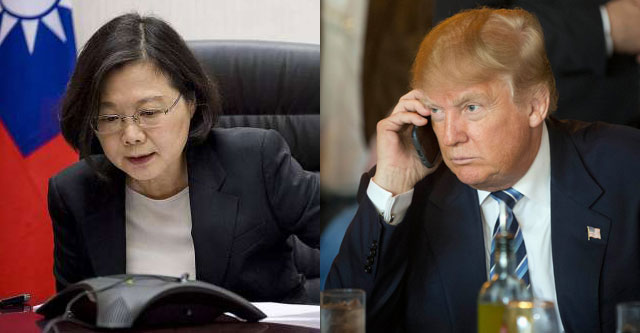Alwaght-In further escalation of Beijing-Washington ties Taiwanese (China Taipei) President met senior US Republican lawmakers in Houston on Sunday.
President Tsai Ing-wen of Taiwan region met with Senator Ted Cruz of Texas in Houston and then flew off to visit Latin American countries including Honduras, Nicaragua, Guatemala and El ¬Salvador. She will stop off in San Francisco after her visit to Central American allies before flying back to Taiwan.
A photograph tweeted by Texas Governor Greg Abbott shows him meeting Tsai, with a small table between them adorned with the US, Texas and Taiwanese flags.
Relations between US-China took a nosedive in December 2016 after US President-elect Donald Trump held a phone conversation with Tsai. Trump became the first US president or president-elect to speak with a Taiwanese leader in an official capacity since the United States severed ties with the island nation in 1979 in favor of pursuing a one China policy with the government in Beijing.
China strongly condemned Taiwan's President meeting with Governor Abbott and Senator Cruz. In a statement on Monday the Chinese Foreign Ministry on Monday urged the US to stick to the "One China" principle and the three communiques on the US-China relations.
"I want to highlight that we strongly condemn Taiwan's president participation in the meeting with US officials under the pretext of a transit stop and her bids to undermine US-China relations," Foreign Ministry Spokesman Lu Kang said at a briefing.
Trump using Taiwan as bargaining chip with China
Trump is pursuing both political and economic motives in playing the Taiwan card. The controversial US President-elect certainly intends to use Taiwan as a bargaining chip in relations with China, including the One-China policy.
After the choreographed call with President Taiwan, Trump declared that his incoming administration may not be “bound by a ‘One-China’ policy unless we make a deal with China having to do with other things, including trade”.
Therefore, Trump will adopt a more confrontational attitude to Beijing with some Republicans branding China as the “most important adversary”. It should be noted that Washington-Beijing tensions began when the Obama administration started pursuing the “pivot to Asia”, a strategic “rebalancing” of US interests from Europe and the West Asia region towards East Asia. There are reports that some senior officials in Trump’s foreign policy team, including Reince Priebus, chairman of the Republican National Committee and the president-elect’s pick as chief of staff, have close ties to Taiwan. By escalating the Beijing-Washington ties, Trump is expected to sell more weapons to Taiwan and other US allies in the region namely, South Korea and Japan while attempting to force a trade deal with China. However, this strategy of using Taiwan as a negotiating card in US-China relations, as expected, is already drawing hostile reaction
One-China principle not negotiable
Beijing is sending strong signals that the One-China principle is non-negotiable. The Global Times, the influential newspaper published by the ruling Communist Party's official People's Daily wrote a hard hitting editorial saying, "Sticking to (the one China) principle is not a capricious request by China upon US presidents, but an obligation of US presidents to maintain China-US relations and respect the existing order of the Asia-Pacific."
US to loose in economic war with China
According to Fortune Magazine, if Trump were to start a trade war with the China, he would certainly loose because the US needs China more than vice versa. Unlike twenty years ago, when China was dramatically underdeveloped, and it wanted access to Western technology and manufacturing techniques, now it has most of what it needs.
The influential magazine notes that China’s foreign currency reserves now stand at more than $3 trillion. In contrast, the US has foreign exchange reserves that hover at around $120 billion. China has also captured major IT markets in India, Latin America, and Africa while a good deal of American high tech equipment is manufactured in China. In the aerospace industries the US would suffer a blow as China would decide to exclusively purchase trillions of dollars’ worth of aircraft from Airbus a European company. On the diplomatic front, if the Trump administration provokes China on territorial sovereignty, the US should expect to face Chinese opposition on major international issues. Therefore, any breach of the One-China principle will be disastrous for the US and might lead to dangerous economic, diplomatic and military confrontations between Beijing and Washington.



























